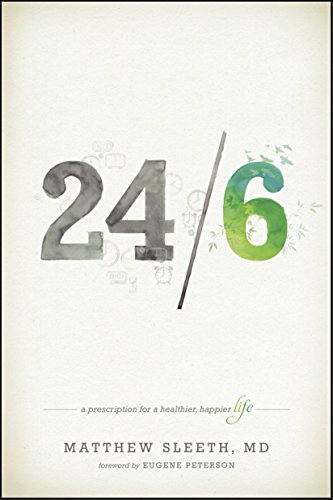“Remember the Sabbath and keep it holy.” Sounds nice, but how do we find rest in a 24/7 world? In 24/6, Dr. Matthew Sleeth describes our symptoms, clarifies the signs, diagnoses the illness, and lays out a simple plan for living a healthier, more God-centered life in a digitally-dazed, always-on world.
Our technological tools allow 24-hour productivity and connectivity, give us more control, and subtlety enslave us to busyness itself. Sabbath is about restraint, about intentionally not doing everything all the time just because we can. Setting aside a day of rest helps us reconnect with our Creator and find the peace of God that passes all understanding. The Sabbath is about letting go of the controls one day a week and letting God be God. So how do we do it?
Sleeth shares how his own family was dramatically transformed when it adopted Sabbath practices and helps readers better understand how their own lives can be transformed — physically, emotionally, relationally and spiritually — by adopting the 24/6 lifestyle.
- Quote: “It is hard to see something that’s not there. Something is missing from our life — something that until now had been safely passed along, generation upon generation.”
- Quote: “If you’ve never seen something, how do you know it’s missing?”
- Notes: The first chapter points out how the “day of rest” has been lost in the sea of new technology, progress, and a culture that has become focused on constant stimulation. To me, this chapter makes me consider how big of an impact observing the Sabbath would have on my life. The author pointed out how one day a week, 52 weeks a year, over an 80 year life span adds up to 11 years! What am I spending that 11 years on now?
- Quote: “Thus, for the purposes of this book, it doesn’t matter what you call the Sabbath — Shabbat, Shabbos, Saturday, Sunday, 24/6, a day of rest, ceasing day, or Stop Day. What’s important is the stopping.”
- Note: [Talking about the seventh day of creation] “Up to this point, everything has been created out of nothing. But on the morning of the seventh day, God makes nothing out of something. Rest is brought into being.”
- Note: In this chapter, the author addresses the controversy surrounding what day should be the Sabbath. He talks about the change in calendars, if we need to observe Sabbath on the same day of the week as Moses, and if it’s possible to even determine what day of the week that was. He also talks about how, there was definitely still a creation on the seventh day, even though nothing tangible was created on it.
- Note: This chapter reminded me that God didn’t rest because He needed to, but perhaps it was because He knew that we needed to. He set the example for what was made a commandment.
- Quote: “Nothing improves the taste of dinner as much as missing lunch. Laying your head on the pillow is never more delightful than after completing a hard day’s work. What better time to educate the human race about rest than after twenty generations of slavery?”
- Quote: “If the Ten Commandments were written on apple pie and you got to choose which slice to have based upon size, choose the fourth. You will get more than a third of the pie put on your plate.”
- Notes: In this chapter, the author talks about how God taught the Israelites about the day of rest, and how the fourth commandment is significantly longer than most of the other commandments. What stood out to me was how the Rabbis turned something that was holy and added a bunch of other “derivative sabbatical rules” in an attempt to enforce it — some religious leaders considered pooping to be work. All that did was make it a chore to make sure you weren’t breaking the Sabbath. I think it is important that, when obeying the Sabbath, it isn’t about following the letter of the law; it’s about following the spirit of the law.
- Quote: “The Son of Man is Lord, even over the Sabbath.” (Luke 6:5)
- Quote: “The minute Jesus steps into his ministry, he stakes his claim on the Sabbath. Jesus declares himself both the lord of the Sabbath and the meaning of the day.”
- Quote: “Then things, good lord, that we pray for, give us the grace to labor for.” — Thomas More
- Quote: “Work consists of whatever a body is obliged to do.” — Mark Twain
- Quote: “Everyone needs rest, not just ten-year-old boys.”
- Quote: “Be still and know that I am God.” (Psalm 46:10)
- Quote:“God is in business for eternity. He has always been and always will be, and if we want to know him better, we had better develop a perspective that sees beyond our short horizon.”
- Quote: “Jesus does come quickly. No one’s personal end time is far off.”
- Notes: This chapter was about time and how we have to spend our time on earth. In the beginning of the chapter, it started out with a story about a little girl named Naomi and how she had started having shoulder pain that was unbearable from her practice at field hockey. It turns out she had a tumor in her chest, and she died a few months later. As Christians, we need to realize that our actual life begins after we die and go to heaven, so we have to develop a new mindset for our short time here on earth.
- Quote: “One problem is that we have no roots. The average American moves every seven years.”
- Quote: “Today’s generation wanders like Hebrews in the desert.”
- Note: This chapter was about how we as people and Christians are not being grounded. We are always on the move, whether moving to a new home, or just moving, and not taking the time to be grounded and to rest.
- Quote: “We tend to place great value on work and its by-products.”
- Quote: “The Sabbath was meant to restore and renew our souls.”
- Note: This chapter talks about how much emphasis we place on work and how we need to utilize our day of rest.
- Quote: “Listeners may not be able to tell the difference between a pastor who is preaching and one who is merely pretending to preach, but the pastor can. Sabbath keeping allows church leaders to recall why they are called.”
- Quote: “Sabbath leads to giving, and giving leads to hospitality.”
- Quote: “We are blessed to be a blessing. The Sabbath is meant to be given away.”
- Note: It is very important for pastors to observe the Sabbath, even if that means their Sabbath is a different day of the week. The Sabbath is to be given away, not hoarded.
- Quote: “We may hang a Joshua 24:15 plaque on the wall, but if our kids see us go to church for an hour and then spend the entire week worshiping other gods, what will they internalize?”
- Quote: “God rarely shows up at the foot of our beds and wakes us up from sleep. We must listen for God in the narrative of life. Stopping one day a week allows my hearing to improve.”
- Note: This chapter talked about being good examples for our kids and modeling the Sabbath for them. Keeping the Sabbath is as much for the kids as it is for the parents.
- Quote: “24/6 is not about working hard and playing hard. It is about working hard and stopping.”
- Quote: “Only fools or misers would derive pleasure from counting money once they were rich. It is the same for those who finally find themselves in possession of the chronologic fortune that the Sabbath represents.”
- Note: In adopting the 24/6 lifestyle we are putting God back in the equation. Hard times will come to us in this life; keeping a Sabbath helps us to keep our focus on God.

